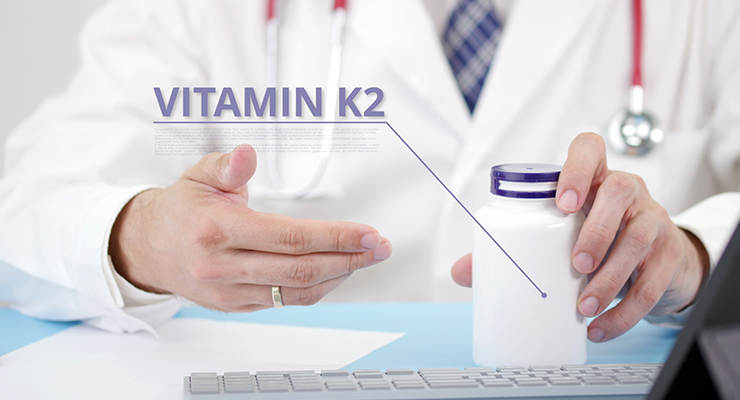07.13.21
A review paper published in Nutrients examined evidence connecting vitamin K2 to factors involved in Alzheimer’s disease (AD) pathogenesis, concluding K2 has the potential to slow the progression of AD and contribute to prevention.
In the review, researchers from the Harvard Extension School and Pacific Northwest University considered the antiapoptotic and antioxidant effects of vitamin K2 and its impact on neuroinflammation, mitochondrial dysfunction, cognition, cardiovascular health, and comorbidities in AD. In their review, they also “examine the link between dysbiosis and vitamin K2 in the context of the microbiome’s role in AD pathogenesis.”
The review claimed to be the first to consider the “physiological roles of vitamin K2 in the context of AD, and, given the recent shift in AD research toward nonpharmacological interventions, our findings emphasize the timeliness and need for clinical studies involving vitamin K2.”
The most common type of dementia, AD affects an estimated 6.2 million Americans. The National Institutes of Health has noted that correcting certain dietary deficiencies can contribute to the prevention or delay dementia caused by AD, and that diet affects the aging brain’s ability to think and remember.
“There is growing evidence for possible dietary risk factors in the development of AD and cognitive decline with age, such as antioxidants, omega-3s, dietary fats, and B vitamins,” said Dr. Hogne Vik, NattoPharma chief medical officer. “Moreover, research suggests that people with low levels of vitamin D are more likely to develop AD and other forms of dementia. We are gratified that vitamin K2 is becoming a prominent part of this conversation, particularly as most of the world’s population expresses a K deficiency. A 2018 paper connected aortic stiffness with an increased risk of dementia in older adults. By activating matrix Gla protein (MGP), vitamin K2 as MK-7 is the only compound to date shown to impact arterial calcification.”
“NattoPharma’s branded vitamin K2, MenaQ7, is the only K2 on the market clinically proven to impact cardiovascular health through its activation of MGP, and the only K2 patented for cardiovascular health,” Vik continued. “But it has also been shown to be anti-inflammatory in human cells and act as an antioxidant, improving endothelial function. There are 17 K-dependent proteins in the body, and we have a strong understanding of a few, which contribute to blood clotting, bone health, and cardiovascular health. These findings shine a light on the importance of continuing our research to articulate the health benefits of activating additional proteins, and the impact that can have on the global population.”
In the review, researchers from the Harvard Extension School and Pacific Northwest University considered the antiapoptotic and antioxidant effects of vitamin K2 and its impact on neuroinflammation, mitochondrial dysfunction, cognition, cardiovascular health, and comorbidities in AD. In their review, they also “examine the link between dysbiosis and vitamin K2 in the context of the microbiome’s role in AD pathogenesis.”
The review claimed to be the first to consider the “physiological roles of vitamin K2 in the context of AD, and, given the recent shift in AD research toward nonpharmacological interventions, our findings emphasize the timeliness and need for clinical studies involving vitamin K2.”
The most common type of dementia, AD affects an estimated 6.2 million Americans. The National Institutes of Health has noted that correcting certain dietary deficiencies can contribute to the prevention or delay dementia caused by AD, and that diet affects the aging brain’s ability to think and remember.
“There is growing evidence for possible dietary risk factors in the development of AD and cognitive decline with age, such as antioxidants, omega-3s, dietary fats, and B vitamins,” said Dr. Hogne Vik, NattoPharma chief medical officer. “Moreover, research suggests that people with low levels of vitamin D are more likely to develop AD and other forms of dementia. We are gratified that vitamin K2 is becoming a prominent part of this conversation, particularly as most of the world’s population expresses a K deficiency. A 2018 paper connected aortic stiffness with an increased risk of dementia in older adults. By activating matrix Gla protein (MGP), vitamin K2 as MK-7 is the only compound to date shown to impact arterial calcification.”
“NattoPharma’s branded vitamin K2, MenaQ7, is the only K2 on the market clinically proven to impact cardiovascular health through its activation of MGP, and the only K2 patented for cardiovascular health,” Vik continued. “But it has also been shown to be anti-inflammatory in human cells and act as an antioxidant, improving endothelial function. There are 17 K-dependent proteins in the body, and we have a strong understanding of a few, which contribute to blood clotting, bone health, and cardiovascular health. These findings shine a light on the importance of continuing our research to articulate the health benefits of activating additional proteins, and the impact that can have on the global population.”




























